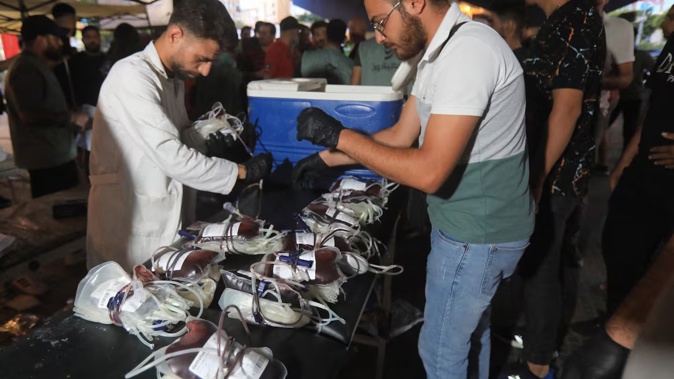
- - Israel’s multistage attack in Lebanon, involving exploding pagers and radios, has raised questions about timing and intentions.
- - Hezbollah vowed retaliation, promising a "reckoning" for Israel after launching attacks on October 8.
- - Despite military preparations, Israel's actions do not appear aimed at initiating all-out war, experts say.
The complex, multistage attack that caused thousands of Hezbollah pagers and handheld radios to explode across Lebanon over the last two days appears to have been meticulously mapped out.
Israel, which rarely comments on its intelligence operations abroad, has neither claimed nor denied responsibility for the attack, which continued into a second day on Wednesday as more devices exploded across Lebanon. The Israelis did not inform the United States about the specifics of the attack before it took place but told Washington afterwards through intelligence channels, according to two US officials. Like others in this story, they spoke on the condition of anonymity to discuss sensitive matters.
Hovering over the unprecedented operation was a critical question: Why now? Israel’s Government is in turmoil and Washington has been trying furiously to head off a wider conflict, leaving experts and officials to wonder about the timing of the attack and what it signalled about Israel’s intentions in Lebanon.
The lack of any major military follow-up by Israel in the hours after the first explosions suggests “the timing wasn’t the optimal one,” said Oded Eilam, a former senior Mossad operative who oversaw international counterterrorism operations.

Mourners toss rice over the coffin of person a killed after hundreds of paging devices exploded in a deadly wave across Lebanon the previous day, during a funeral procession in Beirut's southern suburbs. Photo / AFP
How exactly Israel managed to pull off the operation – and whether it was even over – remained unclear on Wednesday. An adviser to Israel’s military intelligence directorate and a former senior commander in Shin Bet, the country’s internal security service, assessed that agents may have taken control of the beeper supply chain, emptied the devices’ contents and filled them with small amounts of explosives. Once that was complete, he told The Washington Post, there would have been limited time to act: “The level of suspicion is high, and it takes only one to explode [unintentionally] for the operation to be burned.”
Other former Israeli intelligence officials echoed that view, saying such operations – months, if not years, in the making – have a brief shelf life after being put in motion. In the case of the exploding pagers, Hezbollah’s decision to switch to what it thought were more secure lower-tech devices after a wave of targeted Israeli assassinations probably provided a window of opportunity, Eilam explained.
“You need the minimum [amount of time] between installation and pushing the button,” he said.
Strategic considerations, such as whether the operation is likely to land with maximal impact, need to be balanced against the risk of the operation being compromised, he said, describing the attack as Hezbollah’s “Pearl Harbor”. But it was not immediately evident if the operation was intended as a first salvo in a full-scale conflict or a warning to Hezbollah about the potential costs of such a confrontation.
- Walkie-talkies explode in Lebanon day after deadly pager attack; fears of all-out-war
- Exploding pagers kill nine, injure thousands in Lebanon in suspected Israeli attack
“We are at the start of a new phase in the war,” Israeli Defense Minister Yoav Gallant told troops on Wednesday at the Ramat David air base in Haifa. “The centre of gravity is moving northward.”

A man holds a walkie talkie device after he removed the battery during the funeral of persons killed when hundreds of paging devices exploded in a deadly wave across Lebanon the previous day, in Beirut's southern suburbs. Photo / AFP
Hezbollah began launching attacks against Israel on October 8 in support of Hamas and has vowed not to stand down until a ceasefire in Gaza is reached. As ambulances raced again through the streets of Beirut on Wednesday, the militant group promised a “reckoning” for Israel.
In neighbouring Arab states, already on edge after months of intensifying strikes and counterstrikes along the Israel-Lebanon border, intelligence and security officials were rattled by the latest provocation.
“We were already well up the escalatory ladder,” said one regional official. “This was a big gamble by Israel.”
Arab security services speculated that Hezbollah had discovered a problem with the beepers and that Israel faced a “use it or lose it” moment. Otherwise, the timing of the attack made little sense, several officials said.
“Even if they were trying to send a message, why now?” a second regional security official said. “There will be a reaction from Hezbollah. Why do this if you are truly interested in preventing a wider war?”
Prime Minister Benjamin Netanyahu pledged in a recorded video on Wednesday that Israel would “safely return the residents of the north to their homes”. Hezbollah rockets have displaced some 60,000 people from Israeli communities in the north; earlier this week, the country’s security cabinet made their return an official goal of the war.
Israel Defense Forces Chief of Staff Herzi Halevi approved “offensive and defensive” plans for the northern border, the military said in a statement on Wednesday. Israeli military radio reported that the army’s 98th Division would be transferred from Gaza to the north.
For all of the bellicose rhetoric and troops movements, Israel’s military preparations did not appear sufficiently advanced for all-out war, Eilam said, noting that the United States is putting “a lot of pressure” on Israel not to initiate a regional conflagration.

A young Iranian boy holds a candle next to a portrait of a young Lebanese girl who was killed in a deadly pager attack while standing in front of the Lebanese embassy in northern Tehran, Iran. Photo / AFP
Yet Washington appears limited in its ability to constrain its closest Middle Eastern ally. White House officials were outraged by Israel’s assassination of Hamas leader Ismael Haniyeh in late July, at a pivotal moment in cease-fire and hostage release negotiations. In April, Pentagon officials expressed frustration over not being notified in advance of an Israeli strike that killed two senior Iranian commanders near a diplomatic facility in the Syrian capital of Damascus.
A US official said that Israel informed the Biden administration ahead of the pager explosions that it was preparing to conduct some sort of operation in Lebanon but provided no details. Officials were surprised when they saw the scale of the attack: “We were not aware that hundreds of pagers were going to explode in Lebanon at the same time,” the official said.
Amos Hochstein, the White House envoy tasked with averting a war between Israel and Hezbollah, had just arrived in Israel on Monday for talks with Netanyahu. “While Israel appreciates and respects the support of the United States, it will – ultimately – do what is necessary to safeguard its security,” Netanyahu told Hochstein, according to a statement from the prime minister’s office.
The exploding devices were meant “to cause panic, and stress and shock” within Hezbollah, said former Mossad chief Danny Yatom, demonstrating Israel’s ability to breach even the group’s most secure lines of communication.
“It’s an operation that does not stand by itself,” he said. “It’s an operation that might start a more decisive war in Lebanon.”
But the domestic political backdrop to the operation also raised questions about the timing of the attack and its broader strategic significance. The last week was a turbulent one for Israel’s Government, as reports mounted that Netanyahu was seeking to replace Gallant following months of friction over war strategy. Gallant has publicly pushed for Netanyahu to agree to a cease-fire in Gaza, which would allow the military to turn its full attention to Lebanon.
“It’s hard to know if he’d be reckless enough to plan to fire his defence minister knowing Israel was about to engage in such a high-stake operation, or the operation was carried out at the last minute,” said Michael Horowitz, head of intelligence at Le Beck International risk consultancy.
Whatever Israel’s initial intentions before unleashing the attack, the Government will now face growing domestic pressure to capitalise on the momentum and hit Hezbollah while it is down, analysts said. The group has been striking ever deeper into Israel, including 30 attacks over the past two weeks on areas that have not been evacuated, according to Sarit Zehavi, a retired IDF lieutenant colonel and founder of Alma, a nonprofit focused on security in the north.
“It’s unbearable,” Zehavi said. “Untenable.”
Take your Radio, Podcasts and Music with you









